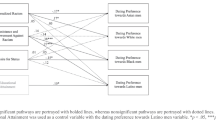Abstract
The purpose of this study was to investigate why some women report a desire to date nice guys but prefer dating jerks. Specifically, young women's dating choices based on their reasons for dating in general and the attractive/unattractive traits that they perceive that a man possesses were explored. Popular texts offer evidence that young women may/may not select nice guys as dating partners because nice guys may/may not be able to provide them with what they want from their dating experiences. Scholarly texts offer evidence that the answer may lie in how the young woman perceives the nice guy—does he possess attractive or unattractive personality traits? The results of the present study suggest that reasons for dating (i.e., not wanting physical contact, wanting stimulating conversation, and wanting an exclusive relationship) and perceived personality traits (i.e., sweet/nice and physically attractive) influence a young woman's desire to date a nice guy, and that perceived personality traits are better predictors of her choice of a man to date than are reasons for dating.
Similar content being viewed by others
References
Alder, R. B., & Rodman, G. (2003). Understanding human communication (8th ed.). New York: Oxford University Press.
Baxter, L. A., & Bullis, C. (1986). Turning points in developing romantic relationships. Human Communication Research, 12, 469–493.
Beland, N. (March 2003). The ultimate guide to the girl next door. Men's Health, 18, 132–140. Retrieved November 7, 2003, from EBSCOHost databases.
Buss, D. M., & Schmitt, D. P. (1993). Sexual strategies theory: An evolutionary perspective on human mating. Psychological Review, 100, 204–233.
Cowan, C., & Kinder, M. (1985). Smart women, foolish choices: Finding the right men, avoiding the wrong ones. New York: Signet.
Desrochers, S. (1995). What types of men are most attractive and most repulsive to women. Sex Roles, 32, 375–391.
Doosje, B., Rojahn, K., & Fischer, A. (1999). Partner preferences as a function of gender, age, political orientation, and level of education. Sex Roles, 40, 45–60.
Feingold, A. (1990). Gender differences in effects of physical attractiveness on romantic attraction: A comparison across five research paradigms. Journal of Personality and Social Psychology, 59, 981–993.
Felmlee, D. H. (2001). From appealing to appalling: Disenchantment with a romantic partner. Sociological Perspectives, 44, 263–280.
Gray, J. (1997). Mars and Venus on a date: A guide for navigating the 5 stages of dating to create a loving and lasting relationship. New York: HarperPaperbacks.
Guy in a Trenchcoat. (2002). The myth of “the nice guy. Overthelimit.com. Retrieved November 7, 2003, from http://www.overthelimit.com/article/367/_the_myth_of_”the_nice_guy”.html
Herold, E. S., & Milhausen, R. R. (1999). Dating preferences of university women: An analysis of the nice guy stereotype. Journal of Sex and Marriage Therapy, 25, 333–343.
Jensen-Campbell, L. A., Graziano, W. G., & West, S. G. (1995). Dominance, prosocial orientation, and female preferences: Do nice guys really finish last? Journal of Personality and Social Psychology, 68, 427–440.
Knapp, M. (1984). Interpersonal communication and human relationships. Boston: Allyn and Bacon.
Kuriansky, J. (1996). The complete idiot's guide to dating. New York: Alpha Books.
Laner, M. R., & Ventrone, N. A. (2000). Dating scripts revisited. Journal of Family Issues, 21, 488–502.
Li, N. P., Bailey, J. M., Kenrick, D. T., & Linsenmeier, J. A. W. (2002). The necessities and luxuries of mate preferences: Testing their tradeoffs. Journal of Personality and Social Psychology, 82, 947–955.
Moore, M., & Gould, J. (2001). Date like a man: What men know about dating and are afraid you'll find out. New York: Quill.
Nice guys vs. jerks. (2003). Retrieved November 7, 2003, from http://www.sosuave.com/women1.htm
Regan, P. C. (1998a). Minimum mate selection standards as a function of perceived mate value, relationship context, and gender. Journal of Psychology and Human Sexuality, 10, 53–73.
Regan, P. C. (1998b). What if you can't get what you want? Willingness to compromise ideal mate selection standards as a function of mate value and relationship context. Personality and Social Psychology Bulletin, 24, 1294–1303.
Schmitt, D. P., Couden, A., & Baker, M. (2001). The effects of sex and temporal context on feelings of romantic desire: An experimental evaluation of sexual strategies theory. Personality and Social Psychology Bulletin, 27, 833–847.
Shanteau, J., & Nagy, G. F. (1979). Probability of acceptance in dating choice. Journal of Personality and Social Psychology, 37, 522–533.
Speed, A., & Gangestad, S. W. (1997). Romantic popularity and mate preferences: A peer nomination study. Personality and Social Psychology Bulletin, 23, 928–937.
Sprecher, S., & Regan, P. C. (2002). Liking some things (in some people) more than others: Partner preferences in romantic relationships and friendships. Journal of Social and Personal Relationships, 19, 463–481.
Stewart, S., Stinnett, H., & Rosenfeld, L. B. (2000). Sex differences in desired characteristics of short-term and long-term relationship partners. Journal of Social and Personal Relationships, 17, 843–853.
Strauss, A., & Corbin, J. (1990). Basics of qualitative research: Grounded theory procedures and techniques. Newbury Park, CA: Sage.
Urbaniak, G. C., & Kilmann, P. R. (2003). Physical attractiveness and the “nice guy paradox:” Do nice guys really finish last? Sex Roles, 49, 413–426.
Williams, A. (1999). The wet spot: Why don't women date nice guys? Retrieved November 7, 2003, from http://www.pottymouth.org/wetspot/wetspot014.html
Wills, R. (2000). Nice guys and players: Becoming the man women want. Arlington, VA: E.R.L. Publishing.
Author information
Authors and Affiliations
Corresponding author
Rights and permissions
About this article
Cite this article
McDaniel, A.K. Young Women's Dating Behavior: Why/Why Not Date a Nice Guy?. Sex Roles 53, 347–359 (2005). https://doi.org/10.1007/s11199-005-6758-z
Issue Date:
DOI: https://doi.org/10.1007/s11199-005-6758-z




